O.C. STORY
First, scroll down to the bottom of this review; there you will find the information you need to buy your tickets to Oanh Nguyen’s magnificently re-interpreted production of West Side Story at the Chance Theater. Second, after you witness the truthfulness of its performers and the strength in its simplicity, I invite you to hold theater to a higher standard, a standard which includes, as this production does, imagination, vision, community, selflessness, and risk-taking.
On the whole, Los Angeles and its surrounding communities consistently produce the most visionless, self-serving, and/or middling productions in the country. This is not up for debate. As producers in L.A. meet to figure out the future of theater and perhaps form a Theater League (which will create a whole new set of problems, no doubt), the entire Los Angeles theater community would do well to take a tip from the Chance Theater.
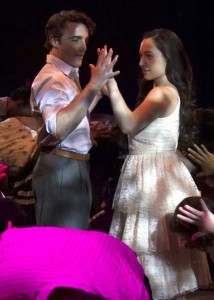 Tucked away in an unassuming Anaheim Hills industrial strip mall, this non-Equity theater company consistently produces some of the best theater outside of Chicago. Whether Chance is aware of it or not, they are actually following the models of many successful “storefront theaters” in the Windy City:
Tucked away in an unassuming Anaheim Hills industrial strip mall, this non-Equity theater company consistently produces some of the best theater outside of Chicago. Whether Chance is aware of it or not, they are actually following the models of many successful “storefront theaters” in the Windy City:
- They have their own flexible black box space, rather than renting a traditional 99-seat theater from overcharging, unscrupulous landlords. Bradley Kaye’s West Side Story set has two rows of audience members facing each other’”as such, performers are above, below, behind, and on both sides of the spectators; when all 25 actors beautifully rendered the “Tonight” quintet all around us, the result was both thrilling and emotional.
- They have adventurous seasons which include world premieres, west coast premieres and revivals. In conservative Orange County, the Chance produced Jerry Springer: The Opera and Edward Albee’s The Goat’”to call that a risk is an understatement.
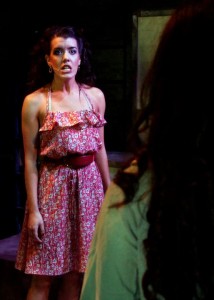 They have an artistic director (Oanh Nguyen) who is artistic and can actually direct; his production of Merrily We Roll Along, virtually set-free, was the most cohesive and satisfying of the eight productions I have witnessed. Nguyen actually de-constructs the grandeur normally associated with West Side Story, focusing on the emotional relationship between Tony and Maria, played to perfection by Keaton Williams and Gina Velez; the normally huge New York skyline and roving ladders and balcony were replaced with nothing but exuberant young love’”I dare you not to weep.
They have an artistic director (Oanh Nguyen) who is artistic and can actually direct; his production of Merrily We Roll Along, virtually set-free, was the most cohesive and satisfying of the eight productions I have witnessed. Nguyen actually de-constructs the grandeur normally associated with West Side Story, focusing on the emotional relationship between Tony and Maria, played to perfection by Keaton Williams and Gina Velez; the normally huge New York skyline and roving ladders and balcony were replaced with nothing but exuberant young love’”I dare you not to weep.- They have resident artists (or “ensemble members,” if you follow the Steppenwolf model); one of these is choreographer Kelly Todd, who abandoned the Jerome Robbins copycatting seen in virtually every production of West Side Story for movement that is rough, raw, fiery, seemingly unpolished, and awash in character; the innocence captured in the barefoot “Somewhere” ballet was almost too painful to watch.
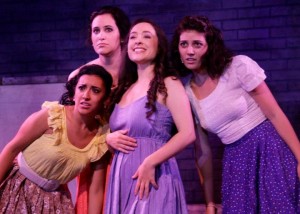 Their non-Equity status proves that Equity actors are not necessarily better at their craft (it was shocking to discover how many amazing Chicago companies are non-Equity as well); The way I see it, Chance is more invested in “powerful, socially-conscious, provocative, intimate theater experiences” than in placating a union which has no compunctions when it comes to sacrificing art for commerce.
Their non-Equity status proves that Equity actors are not necessarily better at their craft (it was shocking to discover how many amazing Chicago companies are non-Equity as well); The way I see it, Chance is more invested in “powerful, socially-conscious, provocative, intimate theater experiences” than in placating a union which has no compunctions when it comes to sacrificing art for commerce.- Part of their mission statement is to both nurture local artists and empower creative young minds’”many of the cast in West Side Story are attendees or graduates of nearby Cal State Fullerton.
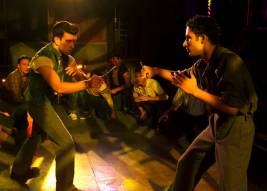 They have technology partners who can promote and sample their wares: BCT entertainment supplied fixtures manufactured by Electronic Theatre Controls. The result? West Side Story utilizes LED instead of conventional lighting fixtures, and KC Wilkerson’s design heightens emotion and adds character, such as the effect of blinking neon lights emulating a New York scene-scape.
They have technology partners who can promote and sample their wares: BCT entertainment supplied fixtures manufactured by Electronic Theatre Controls. The result? West Side Story utilizes LED instead of conventional lighting fixtures, and KC Wilkerson’s design heightens emotion and adds character, such as the effect of blinking neon lights emulating a New York scene-scape.- The Chance wishes to generate participation and dialogue among diverse communities’”this is why they offer a talkback after every performance.
Because of the Chance’s amazing work, the community responds in kind, including annual fund donors, benefactors and producers. The extraordinary technical triumph of their Tommy got the attention of Segerstrom Center, which co-produced an extension of that show. When a non-Equity company gets the attention of Steppenwolf in Chicago, the celebrated company actually offers the use of their Garage space’”could you imagine Center Theatre Group being so generous and involved with its community?
As producers scratch their collective heads figuring out ways to make Los Angeles a recognizable theater town (it’s already the largest), it’s comforting to know that the answer may just reside near the 91 freeway: vision, dedication, community, artistic excellence, and, above all, great theater. If you build it, they will come.
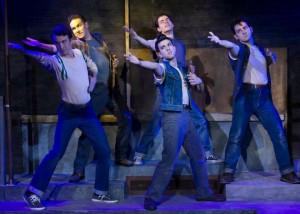
photos by Doug Catiller / True Image Studio.
West Side Story
Chance Theater in Anaheim Hills (Los Angeles Theater)
scheduled to end on August 19, 2012
for tickets, call (714) 777-3033 or by visiting http://www.chancetheatre.com
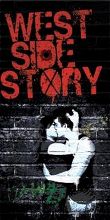

{ 4 comments… read them below or add one }
This review makes me want to drive the 99 miles (each way) to Anaheim Hills to see this intriguing company at work. Among other comments here that catch my attention and assent: Equity vs non-Equity. There is no discernible difference in the quality of Equity and non-Equity performers here in San Diego. You can find abundant brilliance among both groups and many dreary wannabes, too. I prefer to think of a non-Equity actor not as lacking union membership, but as “Equity-Free.” But I digress. Off to Anaheim Hills as soon as possible. That’ll be me.
Walter (commentor), call the Chance ASAP. They are virtually sold out, but I’m sure will accommodate you with extra seating, SRO or something if you express your interest!
I’m not a musical theater fan — I was dragged along (almost kicking) to see this production. I find nearly all musical theater, as you say “the most visionless, self-serving, and/or middling productions …”, but this production blew me away. The interaction I felt as an audience member, the surrounding performance, the set, the lighting … it far exceeds what I’ve seen in much larger venues anywhere in the country, but particularly in southern California. I hope this is a wake-up call to the established theater community—it’s time to be creative and develop a new product for a new, varied—and younger—audience.
Hello! I just wanted to thank you for an especially uplifting and well-written review. Many of the things that you touched on are the reasons that we all do this for a living. I love small theaters, like The Chance, that take risks and have a passion for this art form. It allows actors and audience members to learn from theatre, not just be entertained (that’s always nice too, though!)
Please continue to be such a great advocate for the small, up-and-coming, theaters that we love so much!
Thanks again!